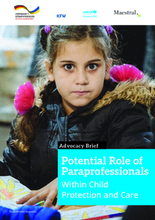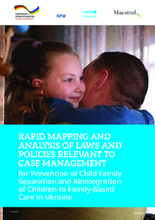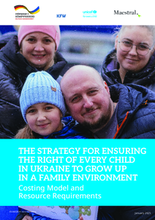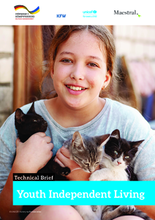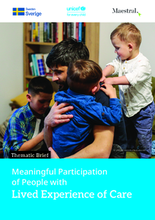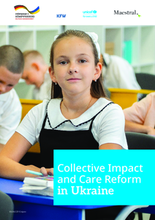Effective
NO SOURCE GIVEN
Social Welfare Spending
NO SOURCE GIVEN
Alternative Care Policy in Line with the 2009 Guidelines
Source: Alternative NGO Report to the UNCRC, 2020
i
In their Alternative Report to the UN Committee on the Rights of the Child (CRC), a collective of Ukrainian NGOs calls on the Government of Ukraine to "bring national legislation in line with the Guidelines for the Alternative Care of Children, in particular with regard to the definitions of 'alternative child care', 'institutional care', 'family-based care', decision-making on child placement, mandatory review of such decisions, and child participation." The report also calls on the government to "bring in line Article 143 (paragraph 3) of the Family Code on the possibility of depriving a child with a disability in a maternity hospital with Article 9 of the Convention on the Rights of the Child." Policies include: Cabinet of Ministers’ Resolution on Conditions and Functioning of Guardianship Care Authorities #866; The Law of Ukraine for Ensuring Organizational and Regulatory Conditions for Social Protection of Orphan Children and Children without Parental Care.
Centralised Authority on Adoption
NO SOURCE GIVEN
Commitment to Deinstitutionalistion
National Strategy on Reform of Institutional Care System for 2017-2026 and Action Plan
i
The Alternative NGO Report to the UN Committee on the Rights of the Child (CRC) notes that “the expected results of the Strategy do not match with the resources allocated. It will be therefore difficult to reduce the number of children in residential institutions by 10% starting from 2018.” However “on a positive note, it is worth noting that in 2016, several regulations were amended, which improved the status of orphans and children deprived of parental care, and became an important step in the deinstitutionalization.” A 2020 Call to Action coordinated by Hope and Homes for Children and Lumos further notes that care reform progress "so far has not been comprehensive and has been met with significant challenges that serve to preserve the current institutional system and risk rolling back the overall process of deinstitutionalisation." The Call to Action also states that "Recent high-level political statements and legislative initiatives are creating a ‘backdoor’ through which many children could be placed unnecessarily in institutions, bypassing the gatekeeping mechanisms that were designed to ensure that no child needlessly enters an institution. For instance, on January 16, 2020 a law was approved which allows the creation of pensions for residence, instead of internats, within special boarding schools. And on 21 August 2020 an order was issued, requesting to amend and exclude special boarding schools, education and rehabilitation centres and sanatorium boarding schools for children from the National Strategy for Deinstitutionalisation. If implemented, this decision would affect more than 50.000 children warehoused across 353 institutions, many of whom have a disability, developmental disorder and/or illness."
Comprehensive Child Protection Law
Source: Alternative NGO Report to the UNCRC, 2020
i
Laws include: The Law of Ukraine on Protection of Childhood, The Law of Ukraine for Ensuring Organizational and Regulatory Conditions for Social Protection of Orphan Children and Children without Parental Care, The Family Code of Ukraine, The Civil Code of Ukraine; Law of Ukraine for prevention of and addressing to violence; Law of Ukraine on Access of Personal Data and Information; Law on public service; Law on Social Services
Continuum of Alternative Care Services Available
Law No. 2342-IV defines the following forms of placement: adoption, guardianship, foster care, family-type orphanage, baby home, children's home, boarding school (Kryvachuk, 2018)
i
"The development of family- and community-based care has been very limited. In other words, services to support families and children are not available. There are also limited family-based care alternatives." (Building a rights-based child protection system in Ukraine, free from institutions, December 2020).
Data System
National Deinstitutionalisation statistical platform: http://diplatform.org.ua/
Existence of a Regulatory Body and Regulatory System
NO SOURCE GIVEN
i
The Alternative NGO Report to the CRC calls on the government to "strengthen the legislative and regulatory framework in order to facilitate family reintegration."
Gatekeeping Mechanism/Policy
NO SOURCE GIVEN
Means of Tracking Progress with Reforms
The Ukrainian Child Rights Network utilized the Tracking Progress Initiative Tool in 2018
Moratorium on Admission into Institutions for Children Under 3
The National Strategy stipulates the implementation of a ban on the placement of children under 3 in institutional care starting in 2020
i
"One indicator of the national strategy stipulates the implementation of a ban on the placement of children under 3 in institutional care, starting from 2020. Yet, as of 01 January 2020, 2,742 children remained confined within 38 baby homes." (Building a rights-based child protection system in Ukraine, free from institutions, December 2020).
Moratorium on New Institutions
NO SOURCE GIVEN
National Action Plan to Guide Reforms
National Strategy on Reform of Institutional Care System for 2017-2026 and Action Plan
i
"The National Strategy of Reforming the System of Institutional Care and Upbringing of Children (2017-2026) and the Action Plan for the implementation of its first stage were approved by the Cabinet of Ministers of Ukraine in 2017. In June 2020, the Cabinet of Ministers approved the Action Plan for the second stage of the reform." (Building a rights-based child protection system in Ukraine, free from institutions, December 2020).
National Standards of Care
Cabinet of Ministers' Decree #565 and Resolution of the Cabinet of Ministers of Ukraine #564
Prevention of Separation Services Available
Source: Opening Doors for Europe's Children 2018 Fact Sheet
i
According to the Opening Doors for Europe's Children 2018 Fact Sheet, "there is a lack of commitment to pursue sustainable child protection reform at the local level. Institutions continue to get public funding and resort to expanding the categories of children to avoid closure. Due to conservative and inflexible budgetary regulations, reallocation of existing resources for deinstitutionalisation or further development of community-based services are not possible either." Furthermore, "the development of community-based services for children and families is largely sporadic due to the lack of funding, lack of legal framework, lack of quality standards or low capacity of the service providers. Where services exist, they are mostly provided by the nongovernmental and civil society organisations and are severely underresourced, especially in rural, remote or deprived areas where needs are the highest."
Support for Careleavers (in Legislation and in Practice)
Source: Hope and Homes for Children, 2015
i
According to a 2015 Hope and Homes for Children report, "legislative acts governing education, health, and social protection of children lack a single, child-centred approach and clear principles, which would combine prevention and support for families with children, provision of education, delivery of health and social services, addressing housing issues and the socialisation of children and young people leaving the institutional care system." Furthermore, the report finds that "Children living in institutions receive no meaningful training on how to live an independent life. There are only a few documented cases where volunteers and NGO representatives organise special courses on life skills for institutionalised children."
State Funding for Institutions
Alternative NGO Report to the UNCRC, 2020
i
According to the 2020 Alternative NGO Report to the UNCRC, in 2014, 5.1 billion UAH (approximately $255 million) were allocated from the state budget to fund institutions, in 2015, about 6.4 billion UAH (approximately $291 million), in 2016 - more than 7 billion UAH (about $280 million). A 2020 Call to Action coordinated by Hope and Homes for Children and Lumos notes that "There have been instances of opposition and malpractice by the authorities which manage institutions (including baby homes), particularly in relation to funding and budgets. In some cases, children have been misdiagnosed to ensure their placement in an institution, e.g. to stop a planned closure and keep public funding flowing in. In other cases, institution directors have re-categorised their facilities by changing the name but not the reality of the setting." Furthermore, "the money does not follow the child, meaning that the statutory funding received by institutions is not transferred once the children are reintegrated into the community, leaving cash-strapped local authorities struggling to pay for the new services to support vulnerable families to stay together."

